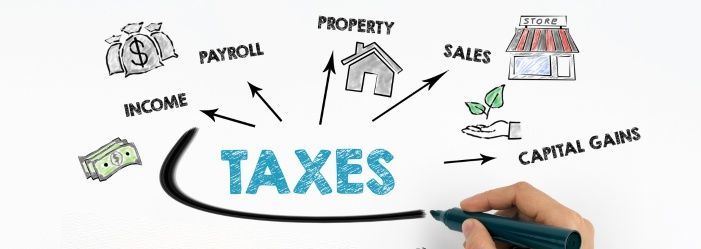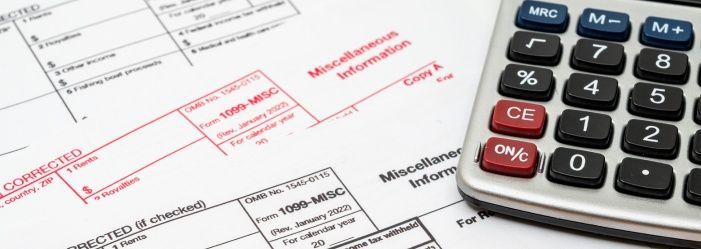Last Updated: March 06, 2025

Disclaimer: We are not qualified legal or tax professionals and are not giving advice. Always speak with a qualified professional before making any legal or financial decisions.
Dealing with debt is tough, and finding a way to settle it for less can feel like a big win. But, there's a tricky part many don't think about taxes. When you settle your debt, it can change your tax situation.
Pacific Debt is here to explain this in simple terms. Our guide will help you understand how settling your debt could affect your taxes, giving you the info you need to make smart choices. Let's dive in and make sense of it all together.
If you'd like to skip the article and speak to a debt specialist right away, click here for a free consultation.
What Are the Tax Consequences of Debt Settlement?
Debt settlement can be a decision that saves you a ton of money. However, debt settlement can also have some fallout potential with the IRS. Did you know that debt settlement for less than the full amount can possibly result in tax consequences? If you are thinking about settling a debt for less than the total, you should understand the possible tax consequences.
Tax Consequences of Debt Settlement
When a creditor writes off all or part of a debt, that creditor can turnaround and then report it to the IRS as lost income and the creditor’s tax burden is reduced by doing this. However, that means you could be responsible for that lost amount. Your forgiven debt or partially forgiven debt can be considered income and you could pay income tax on it. It can even apply to foreclosures.
If you can prove to the IRS that you are legally insolvent, you usually won’t have any tax consequences. If you are insolvent, which means your debts are more than your assets, you may qualify for an exemption.
Also, if you decide to move forward with a debt settlement company like Pacific Debt, you can write off any fees you have paid.
The 1099-C Cancellation of Debt Form

If you are forgiven $600 or more of the original balance, not including interest and fees, the creditor may send you a 1099-C form at the end of the tax year. The amount on this form is now considered income and must be reported to the IRS. The creditor will report it to the IRS in order to lower their tax burden.
If you do not get a 1099-C, don’t assume the IRS doesn’t know about the write-off.
Your creditor may of submitted one to the IRS at some point. If you don’t declare the deficiency balance, you may receive a tax bill plus interest and penalties. And here’s a fun fact about the IRS, they may forgive your tax burden, but they usually don’t forgive your penalties and interest!
How does a 1099 C affect my tax refund?
A 1099-C may affect your tax refund depending on your income and other taxable considerations. Talk to a tax professional if you are filing a 1099-C and see if you qualify for an exception.
What to do if you receive a 1099 C Form?
If you have received a 1099-C from one of your creditors, you need to report the settled debt amount to the IRS as income. You could always ask the creditor yourself if they intend to file a 1099-C with the IRS.
How Much Tax Do You Pay on Forgiven Debt?
The amount of tax you pay on charged off debt depends on your unique situation and your marginal rate of tax. You are considered insolvent if your liabilities exceed your income when you settled the debt. Ask a qualified tax specialist if you can take an insolvency exemption and get your tax debt forgiven.
Debt Settlement or Write-off Tax Consequences
If you are in a debt settlement program, remember that you may have to pay taxes on forgiven debt. Find out if the creditor will be submitting a 1099-C, and if so, the exact amount they will declare on it. Next, keep your eye out for the form after the first of the year. And finally, make sure the 1099-C is correct before you submit it to your tax specialist. If it isn’t, contact the creditor to have it corrected.
If you are curious how much you may
owe, check out a debt forgiveness calculator to get an idea. Remember that this is based on simple information and may not be absolutely correct.
Debt Settlement and Your Credit Score
You will most likely see a negative effect on your credit score from debt settlement but most likely at this point you are already having difficulty paying your bills on time and may already be experiencing a drop in your FICO score, otherwise known as your credit score.
The good news is once you complete our debt settlement program you can then work to improve your credit score and repair your credit. Our debt settlement program can last years to help you reduce your debt so if maintaining a high credit score is your priority, debt settlement might not be for your current financial situation.
You can find out your credit score on any one of the credit bureaus. Once you can access your latest credit report, you can see all the items on your credit. Under the Fair Credit Reporting Act, you're entitled to a free credit report from each major credit bureau once every 12 months. After debt settlement, it's especially important to get a copy of your credit report to ensure all settled debts are properly recorded
You should check your credit report often to see if anything has changed. This may involve contacting the credit bureaus directly to dispute any inaccuracies. If your credit score drops from good credit to bad credit, you'll want to know about it immediately.
The Debt Settlement Process and Timeline
A debt settlement program usually takes between 2-4 years to complete. Here is a typical timeline:
- Month 1: You stop making payments to creditors and start setting aside funds. We help you calculate the right amount to save.
- Months 3-6: We initiate negotiations with your creditors. Offers usually start coming in around month 6.
- Months 6-24: As we reach settlements, funds need to stay set aside until enough accumulates to make settlement offers. During this time, expect late payments and defaults on your credit report.
- Months 24-48: In the second half of the program, most settlements occur. By month 48, you can usually see the light at the end of the tunnel.
- It's critical to stick closely to the program during these 48 months. Failing to set aside funds means not having enough to reach settlements.
For more details, check out our debt payoff calculator to estimate your timeline.
How Debt Settlement Impacts Your Credit
Debt settlement often hurts your credit score, but the severity depends on your situation:
- Missed payments and defaults will be added to your credit report once you stop payments. This can cause your score to drop 100 points or more.
- As debts get settled, they will be marked "Paid Settled" on your report rather than "Paid in Full".
- Your credit utilization ratio will decrease over time as debts shrink, helping your score.
- Rebuilding credit after debt settlement can take 1-2 years of careful financial habits.
Here are some tips for recovering after debt settlement:
- Get a secured credit card and use it responsibly to prove you can handle credit again.
- Limit new credit inquiries while rebuilding score.
- Maintain low revolving credit utilization.
- Consider legitimate credit improvement services to help address negatives (but avoid companies that don't comply with the Credit Repair Organizations Act). Focus on paying your bills on time to gradually rebuild your payment history.
Alternatives to Debt Settlement
While debt settlement is one option to become debt-free, other paths exist too:
- Debt Management Plans: A DMP provided by a credit counseling agency can help arrange reduced interest rates and flexible repayment plans with your creditors. This protects your credit score more than debt settlement.
- Debt Consolidation Loans: These combine multiple debts into one, letting you pay everything off at a lower interest rate. This helps make debts more manageable without damaging credit scores.
- Bankruptcy: As a last resort, personal bankruptcy immediately eliminates most debts. While hurting your credit initially, it provides a fresh slate to rebuild credit after a few years.
Beware of Credit Repair Scams
After debt settlement, you might be tempted by offers to quickly "fix" your credit. Be cautious of credit repair scams that promise to erase negative information from your credit history. Legitimate credit repair takes time. The Credit Repair Organizations Act (CROA) provides important protections, requiring any credit repair organization to provide you with a written contract outlining their services before you pay anything.
FAQs
Conclusion
Debt settlement can be a helpful option for becoming debt-free, but it's important to consider the potential impact on your finances and credit. The process usually takes 2-4 years to complete and settled debt often has tax consequences.
While debt settlement provides relief from burdensome payments, alternatives like debt management plans and loans could be better solutions depending on your situation. As you explore your debt relief options, be sure to understand the pros, cons, and credit implications of each path.
Reach out to a professional like Pacific Debt for tailored advice and to fully grasp what debt settlement entails. With hard work, financial discipline, and the right debt relief strategy, you can overcome debt burdens and work toward financial stability
Pacific Debt Relief
If you’d like more information on debt settlement or have more than $10,000 in credit card debt that you can’t pay, contact Pacific Debt, Inc. We may be able to help you become debt-free in 2 to 4 years. We have settled over $250 million in debt for our customers since 2002. We rate very highly in Top Consumer Reviews, Top Ten Reviews, Consumers Advocate, Consumer Affairs, Trust Pilot, and US News and World Report.
Pacific Debt is currently providing debt relief coverage in the following states:
Alabama, Alaska, Arizona, Arkansas, California, District of Columbia, Florida, Hawaii, Iowa, Idaho, Indiana, Kentucky, Louisiana, Massachusetts, Maryland, Michigan, Minnesota, Missouri, Mississippi, Montana, North Carolina, Nebraska, New Mexico, New York, Oklahoma, Pennsylvania, South Dakota, Texas, Utah, Virginia, Wisconsin
For more information, contact one of our debt specialists today. The initial consultation is free, and our debt experts will give you all your options.
*Disclaimer: Pacific Debt Relief explicitly states that it is not a credit repair organization, and its program does not aim to improve individuals' credit scores. The information provided here is intended solely for educational purposes, aiding consumers in making informed decisions regarding credit and debt matters. The content does not constitute legal or financial advice. Pacific Debt Relief strongly advises individuals to seek the counsel of qualified professionals before undertaking any legal or financial actions.
✔ Accredited by Better Business Bureau with BBB A+ rating (4.93 rating and 1678 reviews)
✔ US News and World Reports and Bankrate ranked Pacific Debt Relief as one of “The Best Debt Relief Companies of 2024”
✔ 6.9 star rating by BestCompany.com (over 2379 client reviews)
✔ 4.8 star rating by TrustPilot based (over 1613 verified consumer reviews)
✔ ConsumerAffairs.com Accredited (over 544 verified reviews with an average rating of 5 stars)
✔ A Top 10 Rated Compan by TopTenReviews.com , ConsumersAdvocate.com and Top10debtconsolidation.com
✔ 4.6 star rating by Google (229 client reviews)
✔ 100% rating by SuperMoney (9 client reviews)
Reduce Your Credit Card Debt By Up to Half

BBB Reviews | 4.9/5.0 Rating









 Do Not Sell My Personal Information
Do Not Sell My Personal Information